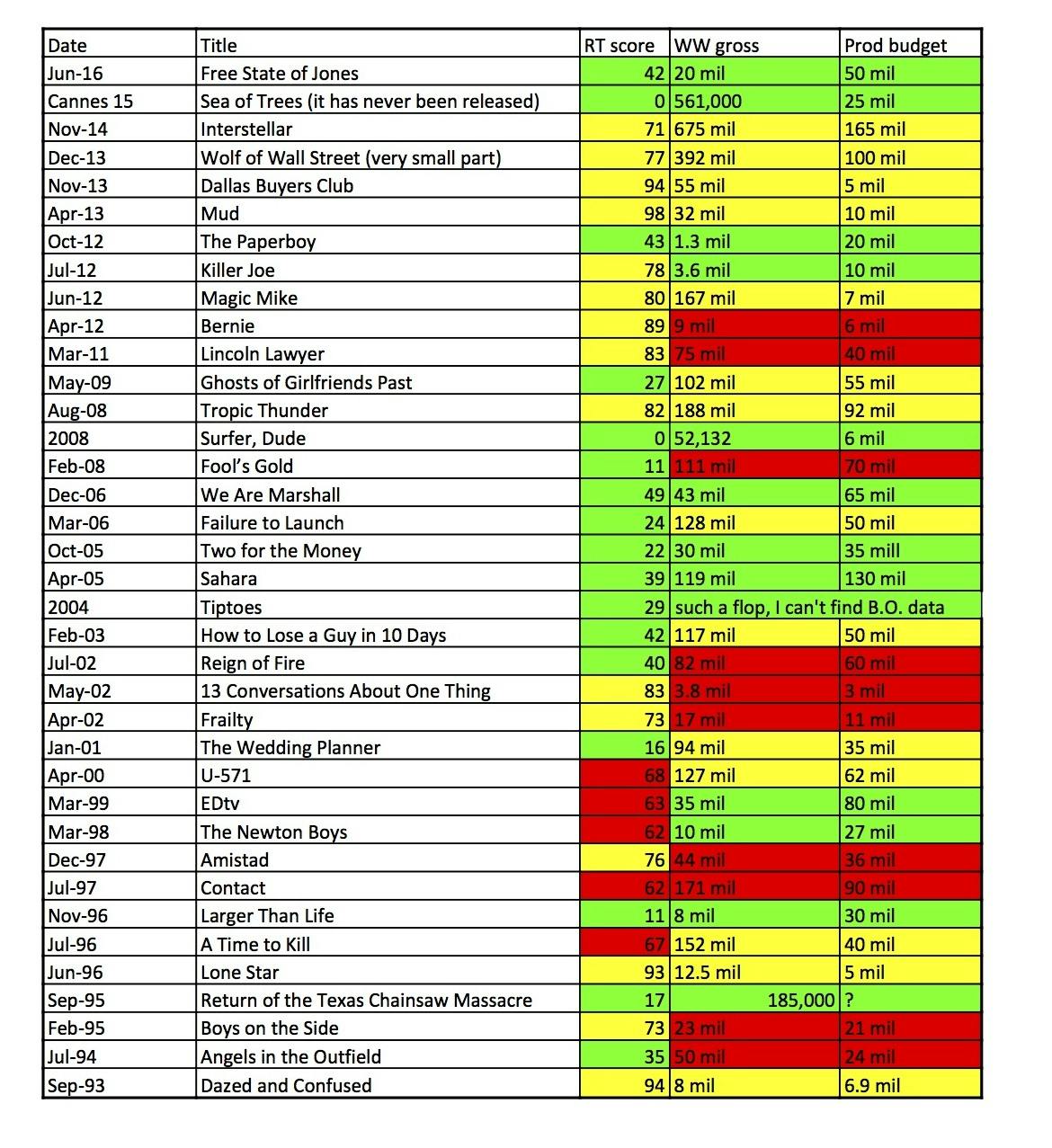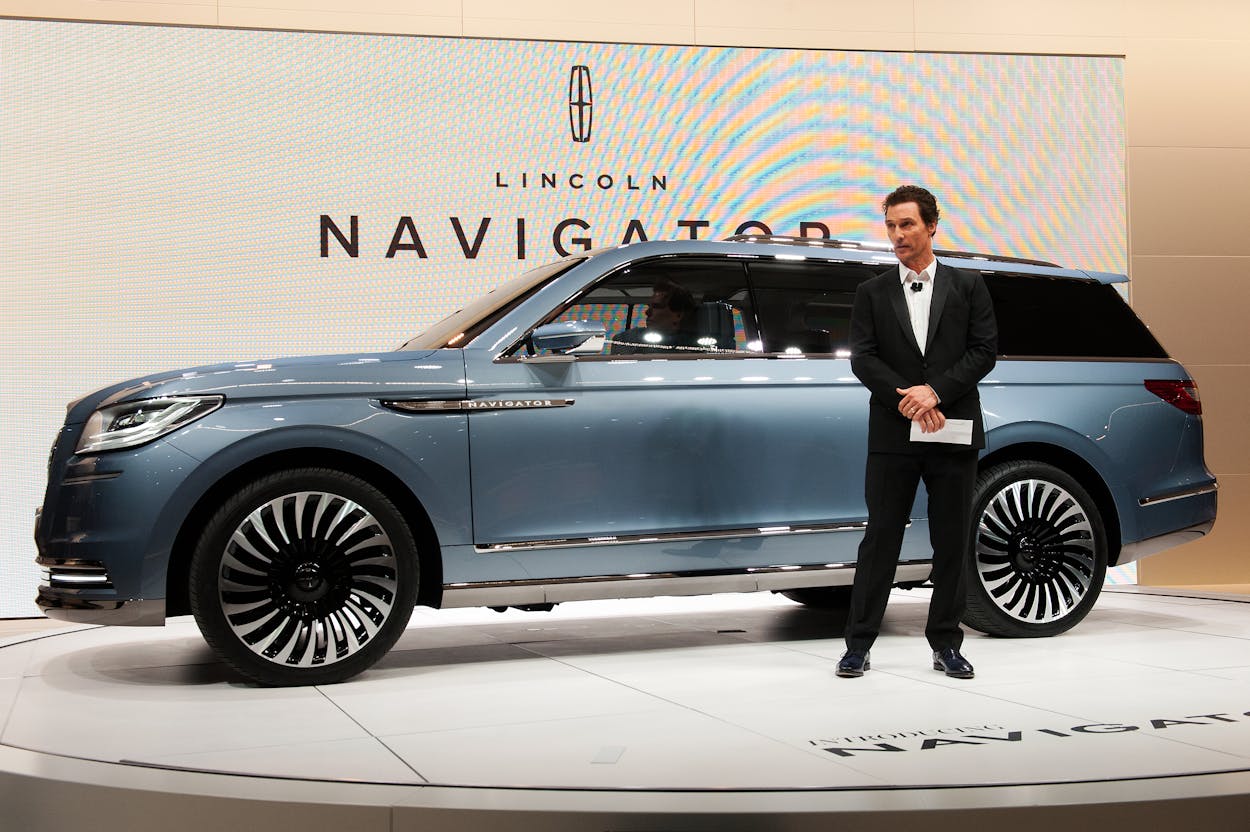This week, Wild Turkey announced that Matthew McConaughey would be the Kentucky bourbon brand’s newest creative director. The internet reacted as expected: with the collective “Say wha? Oh. Hm. ¯\_(ツ)_/¯”, which is basically the series of emotions one experiences when hearing about the career choices of a man who used to brush his teeth exclusively on the beach. I reacted similarly, mostly because advertising exec doesn’t seem to be that much of a stretch for an actor whose curriculum vitae also includes car salesman and UT professor. If anything, the Wild Turkey gig plays right into the overall progression of McConaughey’s movie career, combining the goofy commercialism of his romantic comedy days with the rugged Americana on display in his more recent roles. Plus, shilling bourbon seems to square nicely with McConaughey’s current personal brand: pensive dad poet who may or may not be tipsy.
This is not the first time McConaughey has leveraged his personal brand in an advertising campaign. Lincoln launched a car campaign with the actor in 2014. The Lincoln commercials debuted hot on the heels of McConaughey’s critically acclaimed role in the HBO series True Detective, and the ads felt evocative of the tone and tenor of the show: somewhat rambling dialogue, lots of driving, a somber, washed-out palette for the cinematography, and deep thoughts about the big questions of capital-L life. The Wild Turkey spot that came out earlier this week feels like a sort of extension of the Lincoln commercials, though the first six-minute advertisement portends a campaign that is a bit more direct and a bit less existential. (My favorite sound bite from the Wild Turkey video? “When you talk about bourbon today it’s like you’re talking about your children.”)
But back to those Lincoln commercials, which were parodied on everything from Ellen to Saturday Night Live and have continued to run on television. Unfortunately, they turned out to be more memorable than either of the movies McConaughey has released in the past two years. Last year’s Sea of Trees was booed and jeered at Cannes and has yet to be released in American theaters; this summer’s Free State of Jones was poorly reviewed and has yet to make back even half its budget at the box office. Two consecutive flops doesn’t necessarily mean McConaughey’s career as a prestige actor is over, but it does indicate that his winning streak—specifically the “McConaissance,” a movement that included a string of critically and commercially successful films released between 2011 and 2014—may have run its course.
To understand what’s at stake, we must understand just how successful 2011 to 2014 was for McConaughey. To illustrate things, I made a comprehensive Excel spreadsheet for Matthew’s filmography, organizing each film by release date, Rotten Tomato score, worldwide box office gross and production budget (oh, I’m sorry, is that not something normal people do?).

Movies with a score under fifty are considered critical flops; those scoring between fifty and seventy are pretty good; and those with scores above seventy, which Rotten Tomatoes deems “certified fresh,” are critical successes. It’s not a foolproof method (studio accounting is complicated), but I consider anything that grosses twice its production budget a commercial hit. Those that make more than, but do not double, their production budgets are pretty good, but we can’t determine net profit without knowing what the studio spent to market the film. Obviously, anything that fails to recoup its production costs is a commercial failure. Flops are green, pretty goods are red, and hits are yellow.
The McConaissance kicked off with 2011’s Lincoln Lawyer, which Rotten Tomatoes gave an 83, and continued through 2014’s Interstellar, which received a score of 71. During that three-year period, McConaughey was in nine films, and only one, 2012’s The Paperboy, failed to be certified fresh by Rotten Tomatoes’ standards. Of those nine only two—Paperboy and Killer Joe (also 2012)—did not recoup their production costs. Lincoln Lawyer and Bernie (another 2012 release) did well at the box office, earning almost twice what they cost to make, and Mud (2013), Dallas Buyers Club (2013), The Wolf of Wall Street (2013), and Interstellar (2013) all made at least three times their production budgets. Magic Mike (2012) was a humongous hit, making nearly 23 times (!) its budget. That’s the sort of winning streak that gets its own name, especially when it also includes an Oscar and True Detective season one, which received nearly universal critical praise and averaged 2.33 million viewers per episode. (The True Detective S1 finale, which aired six days after McConaughey won the Oscar, was watched by 3.52 million people and actually crashed HBO’s streaming service. The McConaissance was a cultural phenomenon.)
What made McConaughey’s winning streak such a thing to behold was that it followed a decade in which his career was almost the exact opposite. Starting with 2001’s The Wedding Planner and continuing to 2009’s Ghosts of Girlfriends Past, McConaughey was in fourteen films, and only three of them—Frailty (2002), 13 Conversations About One Thing (2002), and Tropic Thunder (2008)—managed not to be critically panned. Some of his films did very well at the box office, especially the romantic comedies—specifically Wedding Planner, How to Lose a Guy in 10 Days (2003), Failure to Launch (2006), Fool’s Gold (2008), and Girlfriends Past. But between July 2002 and May 2009, McConaughey was in nine consecutive movies that were poorly reviewed. His personal brand reflected this lull. During this time he lived in a trailer on the beach, where he was regularly photographed brushing his teeth, or running shirtless, or sitting like this. By 2009, McConaughey’s reputation was that he was neither a serious actor, nor a particularly serious man.
To his credit, he recognized that he had become a bit of a punchline and made a point to turn his career around. He declined the romantic comedy and ill-thought action film roles that were being offered to him and waited a year and a half for good, juicy, meaty characters to cross his desk. He moved off the beach and back to Texas. He started a family. He worked with some respected auteurs—including Steven Soderbergh, Jeff Nichols, and Richard Linklater, the director who launched McConaughey’s career as the dopey too-old stoner in Dazed and Confused. McConaughey made mostly independent pictures, which showed he was in it not for the money but for love of the game. Then he did what all movie stars do to show how serious they are about acting: he changed his appearance for a role, losing an alarming 38 pounds to star as AIDS patient Ron Woodroof in Dallas Buyers Club, a role that ultimately won him an Academy Award, concrete proof that the industry, and the audiences, took him seriously.
Interstellar was released a few months later, pairing McConaughey with Christopher Nolan, another celebrated director. The movie, a sci-fi blockbuster, did well with critics and even better at the box office.
But then he released those Lincoln commercials, which seemed like True Detective rip-offs and were the butt of many jokes. That he hasn’t had a hit since then is worrisome, as is the idea that the Wild Turkey advertisements could further tarnish his prestigious, hard-earned McConaissance brand.
Still, it hardly seems that McConaughey’s career is in a tailspin. He’s got another movie coming out this December, Gold, in which he’ll play an overweight bald man. (The role was originally rumored to be going to Christian Bale, another serious actor who as changed his appearance so much for movies he’s actually been forced to stop doing so for health reasons.) Given the timing and the necessary weight gain, it feels like McConaughey is making another play for Oscar gold, or at least a nomination. In 2017, McConaughey will costar in The Dark Tower, a Stephen King adaptation being directed by Nikolaj Arcel (the Swedish director of The Girl With the Dragon Tattoo). The film is already riling up the nerds of the internet. Both could be hits, both could be flops, or they could be critical hits and box office flops, or vice versa.
One thing remains: McConaughey’s decades-long career has seen failures and successes of all kinds, but his star power has persisted no matter how bad the films or how goofy his off-screen behavior. This is the man who plays bongos naked, who spends almost every fall Saturday at a UT football game, who named himself as his own hero in his Oscar acceptance speech. Matthew McConaughey’s acting is only a part of what is lovable about Matthew McConaughey. So I have to think, even with more Wild Turkey advertisements, his career will ultimately be, to borrow a phrase, alright, alright, alright.
This post has been updated to correct the spellings of Steven Soderbergh’s and Ron Woodroof’s last names.








